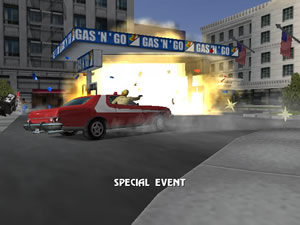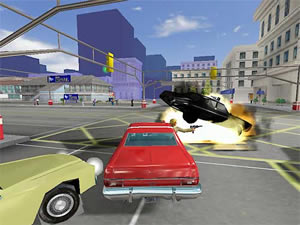Good cop, bad cop.
Whatever happened to cool TV cops? We used to have guys like this
and this, irreverent smartasses
with big guns, great aim, fast cars and interesting hair. They weren’t very realistic,
but they were really entertaining, that’s for damn sure.
I guess all that hair spray eroded the ozone layer in Copland, because those
hip pigs are long since extinct. Now we have guys like this
and this; fat, humorless
shlubs with proper firearms, shaky hands, Toyota Corollas and male pattern baldness.
Makes you miss Barney Miller.
Sorta.
But
when it comes to the perfect marriage of style and substance, you’d be hard
pressed to find ’em any groovier than Starsky & Hutch. Though their
series was as much about lovable pimp squealer Huggybear as it was about actual
cop stuff, it’s one of the few shows that almost stands the test of time, thanks
in no small part to its fresh theme and
a certain striped Ford Torino.
Seems like game magic, right? Maybe if this was 1977 and I still had my Fairchild
Channel F, but since it ain’t and I don’t, I’m a little confused as to why
we’re suddenly getting Starsky & Hutch for the PS2. It’s not
based on the upcoming movie with Ben Stiller and Owen Wilson, so that doesn’t
explain it. Besides, it’s not my job to answer such mind-benders. It’s my job
to tell you why the iconoclastic officers should have held firm to their polyester
past and stayed away from your home console, because despite some interesting
concepts, their game is neither pimp nor player.
The main Story mode is set up like three seasons of the show; each mission is called an episode, totaling 18. Via slightly lazy but appreciatively campy still-frame intro sequences, the missions tell an almost incomprehensible tale of Starsky & Hutch performing heroic acts behind the wheel of the Torino.
In a nod to games like Stuntman, Starsky
& Hutch is as much about style as execution. You cruise through the
city trying to stop bad guys while maintaining your “VR’ (Viewer Rating) points,
which steadily decrease. It’s game over if the points dip to zero or you screw
up your primary goal. If
only the Nielsen Ratings worked the same way.
You get bonus points for driving with style and shooting at bad guys or VR
power-ups, and lose points for hitting pedestrians and innocent drivers or getting shot.
Scattered through each level are other power-ups like better traction, turbos
and damage modifiers, which you have to shoot to activate. The best way to get
high VR, however, is to nail the conspicuously placed ramps and triggering Events:
the game goes into slow-motion and some big crazy car crash ensues, hopefully
with you rumbling through unscathed.
When it all works together, the gameplay can be pretty wily and fun. You’ll
slam through some boxes, powerslide around a turn, shoot a turbo power-up and
hit a ramp to launch through the air while still trying to shoot the getaway
car. There are genuine moments of frantic driving here, and at times the game
captures the essence of a 70’s cop show.
Unfortunately, it wears thin pretty quickly because you keep doing the same
thing. The level design is okay thanks to the large, believable Bay City environment,
but the trial and error is impossible to avoid. Get used to replaying missions.
Occasionally you’ll have to protect another car or try a checkpoint race, but
either way you’ll still be tailing bad guys while trying to keep up your VR
points.
 This
This
gets really annoying. It’s hard to keep your VR points up without a bad guy
to shoot at because the whole ‘driving with style’ thing doesn’t work too well.
If you fall behind due to a minor wipeout, you better hope there are some useful
powerups or jumps handy. Otherwise, kiss your tailpipe goodbye.
There are two other modes – Free Roam and three TV Specials (which are just
fancier missions) – but they both involve the same driving and gunning as Story
mode. You can also unlock some Huggybear extras by finding Huggybear tokens.
Regardless of the mode, the control is pretty tight. The simultaneous driving
and shooting while playing solo can be tricky, but it allows you to manipulate
the environment by shooting stoplights to influence traffic or exploding barrels
to do some collateral damage to ne’er-do-wells, which is a nice touch.
Starsky & Hutch supports both steering wheel and lightgun
peripherals; hook them both up and the game becomes cooperative; one player
will drive while the other will take aim at the TV. You can also use the regular
controller for either action, but good luck moving the aiming cursor if you’re
the gunman. At any rate, it’s good seeing a developer take a risk and hopefully
we’ll see this kind of thing in other games.
Other games, for instance, might feature better graphics. Starsky
& Hutch runs at about 30 fps at its best, but often chugs along like
a PSX game. The textures are bad, Starsky & Hutch’s mouths don’t open to match
the voice work and clipping errors abound. Glitches are also common; I beat
one mission because the enemy car was stuck in limbo on a guardrail. On another
occasion, the game got stuck loading in a music loop that took almost two full
minutes to resolve. Argh.
The theme song is great the first five times you hear it; after that you’ll
want to rip off your leisure suit and don a “Disco Sucks‘ t-shirt. The only
voice from the show is that of Antonio Fargas, Huggybear himself, who also narrates.
I liked Huggy as much as the next five year-old would-be pimp, but the guy even
gets top-billing in the opening credits above Starsky & Hutch. Maybe
it has something to do with his stellar music
career. I guess an ex-pimp’s gotta get his Benjamins somewhere”
Speaking of which, the best part of Starsky & Hutch is that
it only costs a Jackson, which makes it one of the highest quality “bargain”
games yet for the PS2. Is it really worth a twenty? I guess that depends on
how much you miss cool cops. At least it’s a better idea than giving Ricky
Schroeder a badge.

-
Decent driving action
-
Interesting multiplayer
-
Only 20 bucks
-
But is it worth it?
-
Really repetitive
-
Cheap graphics
-
Glitchy







